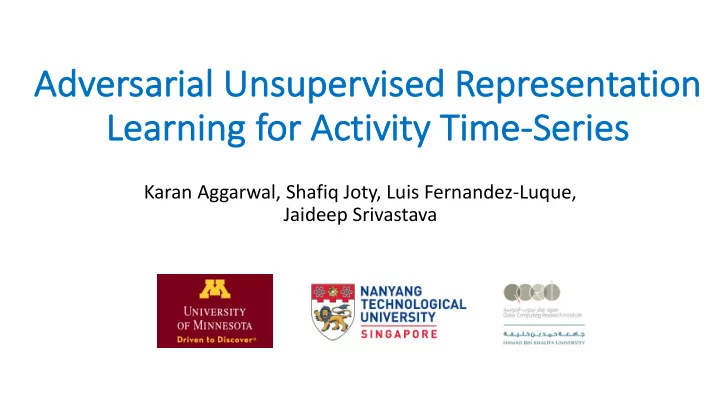

Ad Adver ersa sari rial Unsu super ervi vised sed Rep epresen esentati tion on Le Learning for Activity Time-Se Series Karan Aggarwal, Shafiq Joty, Luis Fernandez-Luque, Jaideep Srivastava
Mo Motivation: : Co Contemp mporary Regime me Therapy and Follow-ups Diagnosis PSG test Lifestyle Changes Information Information Timeline
Mo Motivation: : New Regime me Therapy and Follow-ups Diagnosis PSG test Lifestyle Changes Information Timeline
Mo Motivation • Current disorder screening requires various diagnosis tests and an overnight lab stay for polysomnography (PSG) test • Long waiting for PSG • Extremely difficult to do longitudinal tracking, patient has to show up often at the lab Picture taken from https://aystesis.com/polysomnography / • Wearable devices provide real time and continuous stream of lower quality activity data Sleep 24 X 7 monitoring Awake 4
Motivation Mo Subjects Real time data for all subjects Activity Data from Wearables Fitbit GoogleFit HealthKit Disorders Data EHRs Cohort Study Surveys From a subset of subjects 5
Mo Motivation Subjects Real time data for Supervised all Learning subjects Activity Data from Wearables Fitbit GoogleFit HealthKit Disorders Data EHRs Cohort Study Surveys From a subset of subjects 6
Mo Motivation Subjects Real time data for Supervised all Learning subjects Activity Data from Wearables Fitbit GoogleFit HealthKit Disorders Data EHRs Cohort Study Surveys From a subset of subjects 7
Pr Proposed Approach Unsupervised Representation Learning Subjects Real time activity2vec data for all subjects Supervised Learning Activity Data from Wearables Disorders Data Fitbit EHRs GoogleFit Cohort Study HealthKit Surveys From a subset of subjects 8
Pr Proposed Approach Unsupervised Representation Learning Subjects Real time activity2vec data for all subjects Supervised Learning Activity Data from Wearables Disorders Data Fitbit EHRs GoogleFit Cohort Study HealthKit Surveys From a subset of subjects 9
Proposed Approach & Challenges Pr Convert the time-series S into segments = ( T 1 , T 2 ,T 3 , ……, T m ) Activity time-series R d for each segment T k Learn mapping function Φ : T k is a discrete valued time series like number of steps, activity levels Challenges: • Accounting for the magnitude of time-series values in the segment ( e.g., 25>24) • Capturing the dependencies between the segments • Accounting for the subject’s environment specific noise that wearables suffers from 10
Pr Proposed Approach 11
Pr Proposed Approach Inter- Segment 12
Pr Proposed Approach Inter- Segment Intra - Segment 13
Pr Proposed Approach Subject Environment Invariance Inter- Segment Intra - Segment 14
Se Segme ment Co Content 1) Noise Contrastive Estimation for time-segment values Noise distribution 2) Ordinal Regression for magnitude of time-series values 15
Se Segme ment Co Context 3) Noise Contrastive Estimation for segment neighbors Noise distribution 4) Smoothing with Neighbors 16
Su Subject Invari riance The idea is to remove the subject’s environment noise using adversarial learning over subject, i.e., producing subject invariant representations. Discriminator Loss: Predicting subject from representation Φ( T k ) Adversary Loss: 17
To Total Loss 18
Expe Experimental Materials • Datasets: 7 days of § Hispanic Community Health Study (HCHS): 1887 subjects actigraphy data § Multi-Ethnic Study of Atherosclerosis (MESA): 2237 subjects per subject • Disorder Identification Tasks: § Sleep Apnea § Insomnia We only have labels from HCHS but no labels from MESA § Diabetes § Hypertension 19
Ba Base selines • Traditional time-series classification: - SAX-VSM - BOSS - BOSS-VSM - HCTSA • Deep Learning Methods: - Supervised CNN - Semi-supervised LSTM 20
Re Results Different time-segment granularities 21
Re Results: Supervised vs Unsupervised 22
Co Conclusi sions • Novel model for learning representations of human activity time- series for utilizing large amount of unlabeled data • activity2vec encodes human activity time-series by modeling local (inter-segment) and global activity (intra-segment) patterns • Day-level granularity preserves the best representations since human activities are structured around daily routines usually • Adversarial loss promotes subject invariance reducing the effect of environmental noise on the representations 23
Th Thank y you! 24
Re Results Clusters collapse with in-cluster class separations giving way to global class separations t -SNE plots of HCHS subjects 25
Mo Motivation Traditional Problems Activity Tracking Sleep Sleep Quality 24 X 7 Disorder monitoring Monitoring Awake Our focus Insufficient sleep and/or activity lead to chronic disorders à can be uncovered by analyzing the actigraphy data 26
Mo Motivation Polysomnography (gold standard) Actigraphy Multi-sensor input 24X7 Monitoring Expensive Wearable In-clinic monitoring Noisy High Fidelity Wearable devices provide real time and continuous stream of lower quality activity data – can be used for real-time monitoring? 27
Recommend
More recommend